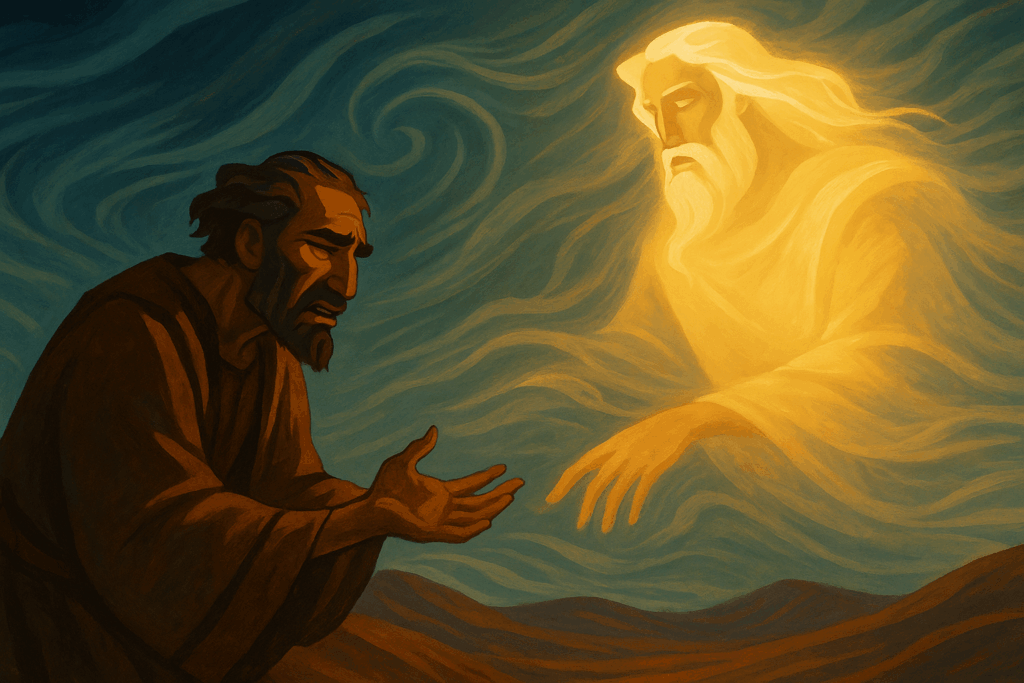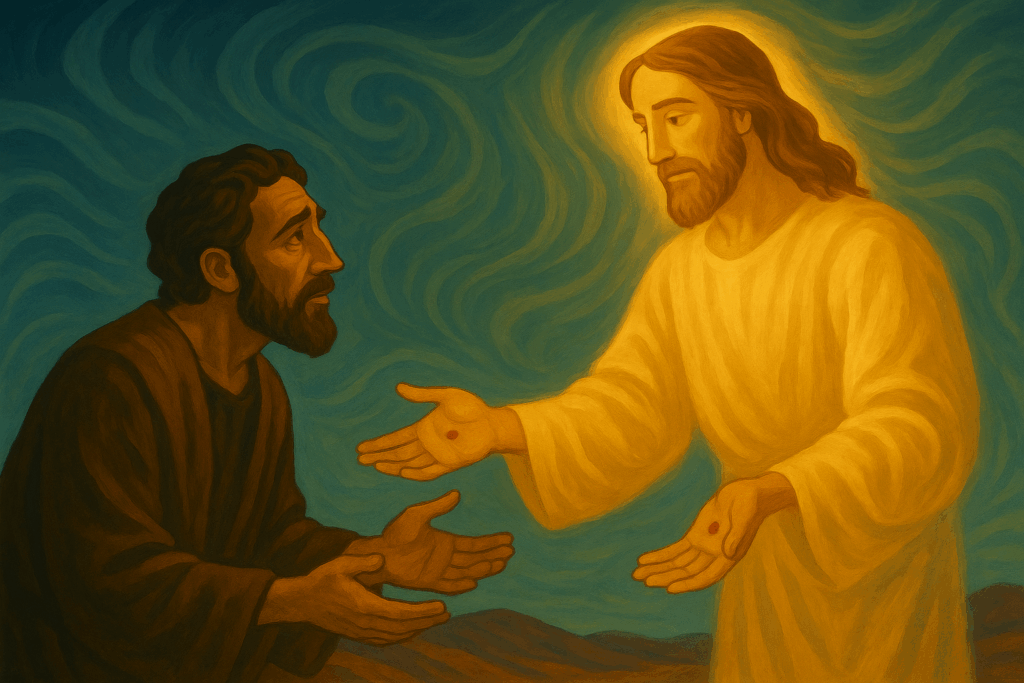Charles Spurgeon has this quote that often visits my thoughts:
“I believe that every particle of dust that dances in the sunbeam does not move an atom more or less than God wishes.”
Essentially, Charles is saying that nothing in this world operates outside of God’s sovereignty. Life, death, joy, and even some of our most unpleasant experiences all operate within the parameters of His wisdom. You get a glimpse of this wisdom in the Book of Job.
PART I: The God of Job
The Book of Job is a tough read, even if you’re a seasoned Christian. You are left with this hammering question in your heart, even if you don’t admit it to yourself:
Wasn’t God a little unfair to Job?
You silence those thoughts immediately by reminding yourself that God restores everything Job lost by the end of the book and, in fact, blesses him even more than He did in the first part of his life.
But the trials Job faced before all this happened were overwhelming, to say the least. Yet, it wasn’t Job’s suffering that troubled me most. It was God’s response to him when Job cried out to God for answers.
Job is met by God in a whirlwind, in all His glory. But instead of comfort or reassurance, Job is met with questions. God demands answers from him. When God broke His silence, it came with all of Heaven’s attention. And throughout everything God said, not once did He say anything like, ‘This was merely a wager with the adversary. I’m proud of you, Job. You did well.’ Job chapter 38 leaves you awestruck and humbled by everything God reveals about His wisdom.
Over the years, I’ve come to recognize God’s voice even in His silence. It is in His silence that I hear Him most clearly. But why is it that when God speaks, I’m sometimes left with more questions than I had before?
I encourage you to read Job’s lament in Chapter 3 alongside God’s response in Chapters 38 through 41. Have two Bibles open—one to Job 3, and the other to Job 38–41. For years, I imagined God as an angry deity emerging from the whirlwind, towering over Job, incapable of understanding his pain, shouting about grand creations and cosmic power. But as you read each line of God’s response, you begin to connect the dots. You’ll see that Job was not met by an angry God in the whirlwind. Instead, the Father responds to Job’s lament, line by line. Let me show you how:

Job’s Lament and God’s Response
Job 3:4
“May the day of my birth perish, and the night that said, ‘A boy is conceived!’ That day—may it turn to darkness; may God above not care about it; may no light shine on it.”
God’s Response (Job 38:12)
“Have you ever given orders to the morning, or shown the dawn its place?”
My Reflection:
God counters Job’s lament with a profound question: “You curse the day you were born? Do you think you can command the day and night? Have you ever ordered the morning to rise or told the dawn where to go? Only I have the authority to do that.”
Job 3:8
“May those who curse days curse that day, those who are ready to rouse Leviathan.”
God’s Response (Job 41:1, 9-10)
“Can you pull in Leviathan with a fishhook or tie down its tongue with a rope? Any hope of subduing it is false; the mere sight of it is overpowering. No one is fierce enough to rouse it. Who then is able to stand against me?”
My Reflection:
God challenges Job: “You speak of the Leviathan I created so casually—can you even attempt to catch it? Do you understand what it takes to subdue such a creature? Only I have that power. If you cannot stand against Leviathan, who are you to talk about curses?”
Job 3:11-12
“Why did I not perish at birth, and die as I came from the womb? Why were there knees to receive me and breasts that I might be nursed?”
God’s Response (Job 38:29)
“From whose womb comes the ice? Who gives birth to the frost from the heavens?”
My Reflection:
God asks Job: “You lament your birth, but do you understand creation, Job? Can you explain whose womb the ice comes from or who gives birth to the frost? If you cannot fathom these mysteries, how can you fully comprehend your own beginning?”
I could go line by line between the two sections, but you see the point I’m trying to make. When you first read the book, it seems as if God is angry with Job for asking questions. But from the whirlwind, you realize that God is simply responding to Job’s cries from Chapter 3. And yet, Job’s response is perhaps the very one we, too, should have had—had we been in his place:
Job 40:4
“I am nothing—how could I ever find the answers? I will cover my mouth with my hand.”
When God breaks His silence, somehow, ironically, we become silent.
PART II: The God of Simon
“Then he remembered the word Jesus had spoken: ‘Before the rooster crows, you will deny me three times.’ And he went outside and wept bitterly.” (Matthew 26:69–75)
I’m going to go on a slight tangent now, just to highlight a difference in God’s tone when dealing with broken people.
When Simon weeps, just like Job, God addresses his harsh words as well—words I am sure we may not have said verbatim but definitely in action. Yet, we see a different side of God in His interaction with Simon. God appears to him just like He did with Job—not from a whirlwind this time, however.
This time, there is no storm or lightning. It is a calm, cool, and quiet setting.
I imagine God sitting beside Simon, placing His arm around him as they watch the waves lapping at the shore. Simon can feel the raised bump of the nail-pierced hand on his shoulder. I imagine there may have been a few sheep eating grass at a distance, baaing as Simon’s heart rhythmically thumps while he waits for God to speak.
Is He going to address what happened on the night the Lord was arrested? This silence before God’s response may have been as overwhelming as the one Job heard right before the whirlwind.
The First Question
“Simon, son of John, do you love me more than these?” (John 21:15)
Simon is immediately taken back to that night again. His mind echoes with the memory of his first denial:
“Woman, I do not know Him.” (Luke 22:57)
I imagine Simon struggling to collect his thoughts at first. He knows. Of course, He knows. Jesus said it would happen. He was there that night when the rooster crowed. But now, Simon is looking at a different Jesus—a resurrected Jesus. One who has conquered death.
Simon quickly sees the opportunity that God has offered him and responds:
“Yes, Lord, you know that I love you.”
Jesus said, “Feed my lambs.”
Suddenly, the self-induced scar of his first denial slowly disappears. Peter feels lighter.

The Second Question
“Simon, son of John, do you love me?” (John 21:16)
Peter recalls his second denial: “You also are one of them.” But Peter said, “Man, I am not.” (Luke 22:58)
Again, Peter understands what’s happening. He wastes no time. He answers almost as a matter of fact with conviction:
“Yes, Lord, you know that I love you.”
Jesus said, “Take care of my sheep.”
Another scar from his heart fades, and Peter feels something stirring within him. He realizes what’s happening: God is allowing him to redeem himself for his past failures. Jesus is reinstating him.
The Third Question
“Simon, son of John, do you love me?” (John 21:17)
Peter remembers his final denial:
“Man, I do not know what you are talking about.” (Luke 22:60)
This time, Peter feels hurt that Jesus has to ask him three times a truth he knows the Lord knows. And yet, Peter recognizes that this hurt he feels is nothing compared to the hurt Jesus felt on the night of His arrest when he denied him three times.
The mouth he used to hurl the very same curses to deny Jesus is about to say something different now. Peter responds:
“Lord, you know all things; you know that I love you.”
Jesus said, “Feed my sheep.”
I imagine that this would be the last time Jesus refers to Peter as “Simon, son of John.” Because after this moment, the former self has truly died. After this moment, Simon is now reinstated to his original name that Jesus gave him.
Simon’s wounds have been dealt with. The fisherman who denied his Lord has now become Peter—the Rock of Christ.
The Infinite Wisdom of God
Why does God respond differently to Job and Peter? You might say that they both committed different acts of disobedience. One questioned God, while the other denied Him.
Really? Isn’t any form of rebellion against God the same to Him? Does God distinguish between a drop of sin or an ocean’s worth of it? And yet, even though His justice and mercy are always perfect, He does not treat us as we deserve.
So why does He speak from a whirlwind to one and with a whisper of comfort and love to the other?
This is what I would like to call wisdom.

Isaiah 55:8-9
“For my thoughts are not your thoughts, neither are your ways my ways,” declares the Lord. “As the heavens are higher than the earth, so are my ways higher than your ways and my thoughts than your thoughts.”
God, in His wisdom, knows what each heart requires. Job needed a loud reproach to grasp the enormity of God’s sovereignty, while Peter needed only a gentle push to become the man he was meant to be. Even though God dealt with them differently, His essence remains the same. The God of Job is the same God of Peter. His justice and mercy are incorruptible. His approach is perfectly tailored to each of His children. Sometimes He speaks from the whirlwind, and other times, He puts your head close to His bosom and whispers.
Why does God allow suffering? Why does He treat some believers differently from others? Why does He speak to some through visions and to others through silence? These questions become even more perplexing when you realize that the second part of Job’s life was more blessed than the first—while the second part of Peter’s life ended in him being crucified upside down. Yet, if you were to ask both men whether they were content, I imagine that both of them would give you the same answer: He knows better than I.
And this is my response to God’s wisdom and my many questions regarding the events of my life:
Because God, in His infinite wisdom, knows, I don’t need to know.
So the next time you see dust particles dancing in a sunbeam, remember this: not one particle moves a single atom’s width without God allowing it.
Jesus loves you!


Good! I had never thought God’s questions were actually responses to Job’s questions
Dear Shawna,
We went through your blog and we’re so proud of you, kutta! May God continue to bless you and grant you even deeper revelations. We’re truly happy to see how He is using you more and more.
Appa and Amma
Wonderful! Praise be to the Lord Jesus, in whom are hidden all the treasures of wisdom and knowledge.
Because God, in His infinite wisdom, knows I don’t need to know.
I love this : )
Wonderful thoughts. God does not treat us the way we deserve, yet in his abundant mercy he touches our heart, heals our heart and strengthens our spirit. Lord bless you Shawn.